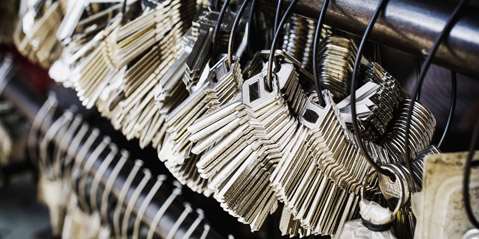Your Cart is Empty
Enjoy 10% off sitewide and up to 25% off our Holiday Collection. Discounts will be applied at checkout. Click here to shop our End of Year Sale!
Enjoy 10% off sitewide and up to 25% off our Holiday Collection. Discounts will be applied at checkout. Click here to shop our End of Year Sale!

The digital revolution has permanently altered a number of different industries, many of which are struggling to find their footing in this new era where regular people can use digital tools to make just about anything. One such industry is key making, which is suffering somewhat of an identity crisis due to new digital technologies that are threatening its very existence. With the right equipment and a few clicks of a mouse, virtually anyone can copy and 3D print a key, including many of the restricted keys on the market that are designed to thwart copying attempts.
Researchers at the University of Michigan recently released a web-based software application entitled “Keysforge” that enables users to 3D print a wide range of restricted keys. All you need is a restricted key blank and a photo of the front side of the lock, and Keysforge will generate a CAD file that you can then use to 3D print a working version of the key. This basically enables any would-be troublemaker to duplicate any number of high-security restricted keys (and regular keys for that matter) without ever visiting a hardware store or locksmith’s shop.
Even the well-known practice of lock bumping has received a boost in effectiveness by way of digital technology. Competitive lock pickers and security consultants Jos Weyers and Christian Holler have recently developed a proprietary software known as “Photobump,” which enables users to 3D print bump keys without even having to know the make or model of the lock.
All you need is a photo of the lock’s keyhole and its pin depth measurements (which can be easily derived by sticking a small tool into the keyhole), and the software will then generate a 3D-printable CAD model of the key. Even if you don’t have the plastic material on-hand to do the actual printing, you can send the CAD file to a third-party 3D printing service such as i.materialise or Shapeways and have your key(s) printed for you.
Any would-be thief with access to these kinds of tools can have a field day creating bump keys for whatever lock he/she might choose. If this information doesn’t disturb you, you might not be paying attention.
This whole unsettling scenario can be completely avoided if you switch from traditional keys to keyless locks. Why worry about what new technologies or inventions might be used (or misused) to duplicate your keys, when you can get rid of the need to have keys altogether by going keyless? One thing that criminals haven’t figured out how to do is read your mind, which is exactly what they would need to do in order to figure out your security access code for a keyless lock.
Using a lock such as the Lockey 2835, all you would have to do is establish your personal security code, and then type it into the lock’s keypad to gain access to your home, no worries about 3D-printed key replicas or bump keys required. Now doesn’t that make everything so much safer and easier? Yeah, we think so, too.
© 2024 GoKeyless. All rights reserved. Privacy Policy. Terms of Use. Powered by Brandography.